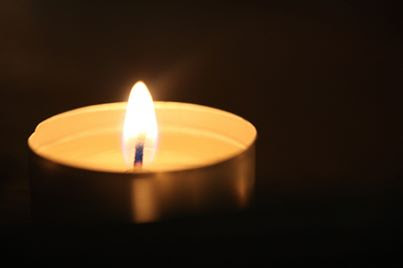We asked people to share their experiences of sitting shiva. Below are some responses.
***
Looking back I can see that when my sister died it was the fact that there was a proscribed process that fell into place and that my community fulfilled their role of caring for me that got me through. A few months later I asked my husband, "was there food at the shiva?" I had this sudden worry that I had forgotten to feed people. But here's the thing, when you're in mourning, you aren't supposed to feed people; they are supposed to feed you. "Yes, honey, there was lots of food. People brought a lot," he replied.
***
In my case my dad passed away while I was still going through the conversion process. Still, keeping the rules of shiva, shloshim and kaddish helped me cope with the situation pretty well. But, above all, having my friends and my community around me taking care of me and helping me go through the different stages of mourning helped me a lot and left me with a sense of belonging and of gratitude hard to explain to outsiders. Guess this was my first strong experience of what converting means: not just believing or behaving in a certain way, but also becoming part of the Am Israel, part of a bigger Me called the Jewish Family.
***
About an hour before the service for my sister, I really wanted to cancel it. Felt like I was gonna throw up, just out of nerves and misery. My sister wasn't Jewish and it felt weird to have my long-standing Jewish life crashing into my non-Jewish family and past life. Ended up feeling deeply grateful and comforted, and glad I went through with it, but I sure was uncomfortable for a few hours.
***
I have just returned from my grandmother's funeral. In the collective experiences of converts, we do a lot of thinking and talking about dealing with “the Christmas season”, but do fairly little in terms of funeral traditions. I would be so very curious to hear other converts experiences of and reflections on participating in family end-of-life issues.
I have an admittedly skewed view on this, as I have connected with Judaism through working with the Chevrah Kaddisha (the “holy society” tasked with carrying out the various rituals and traditions around end of life). As a result, I likely have more familiarity with traditional Jewish practices than most.
I've spent the past 6 days with my parents and aunts and uncles planning and attending a funeral for my grandmother, who was a life-long Methodist. Over the course of the whole process, little things jumped out at me. I found myself very uncomfortable with the prospect of an open casket, but also realized that it was what my family members needed to support their grieving. In the funeral service, I asked myself “Should I recite the Lord's Prayer, (which I know by heart), because it would cause my grandmother so much pain to know I didn't?” At the cemetery, I found myself wanting to hang around, to be present for the actual lowering of the casket, and to shovel some dirt on top (which is certainly a very foreign custom to both my family and the cemetery staff in rural Oklahoma).
I was more acutely aware of my Jewishness – and more importantly, my non-Jewish origins – over the past week than I have been in a long time. It was an added stress on an already stressful time. All in all, I think I navigated it fairly well. I ended up avoiding the room whenever the casket was open. I arranged with the funeral home to sit with the (closed) casket the night before the funeral, in keeping with the Jewish tradition of Shmira. In the end, I found myself saying the Lord's Prayer in honor of my grandmother, but skipping the Affirmation of Faith. In exchange, I plan to say Kaddish for my grandmother and mark her yartzeit, even though she would have been uncomfortable with the thought of being honored in that way.
I understand that, much like the whole Christmas question, each person must find a balance. But the whole thing got me thinking about how I was going to navigate future funerals– especially those I was more intimately involved in planning. I would just be very curious to hear from others how they balanced their needs as a (Jewish) mourner with the beliefs and wishes of the deceased non-Jewish family members?

 RSS Feed
RSS Feed